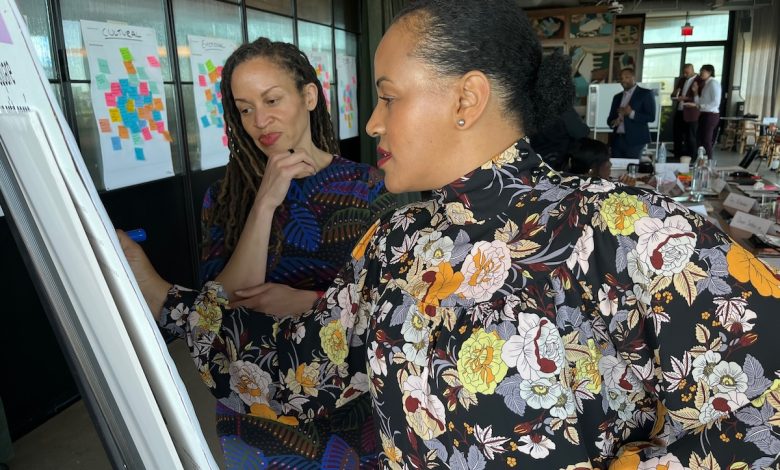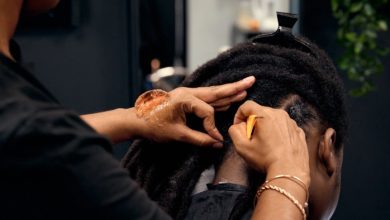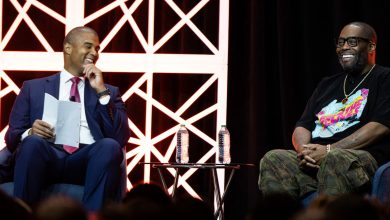Black entrepreneurs redefine economic prosperity

Federal shifts in diversity standards and looming concerns over the future of equity are no match for business leaders compelled with the tips and tools to a successful trade, at least according to these Black self-starters leveraging their entrepreneurial status to help others forge paths to economic and communal wealth.
“We don’t need permission. We don’t need validation, we don’t need a corporate initiative to succeed,” said Mick Hunt, a leadership expert hailing from South Carolina. “The future belongs to those who own their narrative, who control their opportunities, and who move with intelligence, strategy and execution.”
Hunt, founder of the self-improvement podcast “Mick Unplugged,” works to build the future of Black wealth by offering leaders across the nation a blueprint to leadership skills, strategic value, and even gauging how to create an impact in communities beyond monetary value and revenue.
Having grown up a witness to the detriments of financial and emotional spousal abuse, Hunt transformed a promise into a passion for equity, inclusion and achieving sovereignty — not just for himself and two younger siblings, but for all hustlers breaking new ground to greatness.

“That’s the mark I want to leave,” Hunt told The Informer, “not only that I talk about it, but I executed and have left a blueprint for anyone who wants to follow and exceed my footsteps.”
As Hunt embodies action and intent, that mission is reflected in the nation’s capital through a rallying cry for entrepreneurial success, evident in the Black-women owned English Hudson Consulting company.
Similar to Hunt, a spirit of intention and resilience thrives in the testimonies of company founders Lynn English and Marlissa Hudson, who shared with The Informer their own visions for economic prosperity, cultural reform, and pivoting tribulation to triumph despite the troublesome times.
“There’s just no sugar coating that there are things happening that I did not think I would see in my lifetime. We can’t say this is easy, but we can say that we know how to support our community,” English said. “Let’s use some of the solutions we know that work, which is [to] support Black businesses, support one another, reinvest in our community, and we will get through this.”
Mentorship, Resources and Disrupting Cultural Trauma
In what Hudson calls “really a love story,” the dynamic duo’s mentor-turned-business partnership emerged in 2021 with the means to empower Black and brown leaders — particularly Black women — to scale reputable enterprises and create lasting impact.
Hudson, a former opera singer of 20 years, told The Informer she had no prior knowledge nor experience with the industry she passionately serves today, until English’s limitless undertaking allowed her to blossom into “an engine for driving capital.”
Now, the consulting service champions equity across communities nationwide. They work with victim service providers, housing developers, institutes for returning citizens, among other organizations and nonprofits, to teach the values of brand marketing, networking and overcoming oppressive cycles that too often plague communities of color.
“We are creating a live ecosystem of Black liberation, is the bottom line. And there’s a lot that goes into that, but we know it starts with resources,” Hudson told The Informer.
She emphasized the need to strengthen the building blocks in order to lead an enterprise successfully.
“Are there infrastructure and other structural challenges, sure, but nobody taught these folks the back office aspects of running a business, which fundraising is a big piece of, marketing another,” Hudson highlighted. “And then further, once you’ve got a great idea…how do you take it from the creative concept to a business enterprise?”
With more than 30 years in fundraising and nonprofit development, English noted some of the most strenuous obstacles for Black founders stem from preconceived notions around financial aid, specifically a lack of authenticity or willingness to ask for funds.

Thus, English Hudson Consulting centers initiatives like “Fundraising While Black” to help clients unpack the roots of their financial strains that might stem from a complicated relationship with money.
“What we always talk about — what are the pain points, how do we help alleviate those? And then the other big question … how do you win?” said English of the company’s business model. “When you can get people to focus on some very basic pillars about what’s holding them back and where they want to go, we can have a different conversation and help them really think about how to move forward.”
For Hunt, part of moving forward means reshaping ideals behind the loss of diversity, equity and inclusion (DEI), and leaning in on “power, and not participation.”
Another proponent of education meets influence, Hunt celebrates the contributions of African American strategists like Mary Ellen Pleasant and A.G. Gaston — adding the latter “wrote the blueprint on economic power” — as pivotal to shaping his values of strategy in business and leadership. Further, he credits Gaston for teaching him the principles of ownership and creating solutions “for actual needs,” something he’s adamant to instill in his fellow entrepreneurs today.
“DEI struggled and we’re getting the pushback because we always looked at it as a program and we didn’t look at it as a pathway,” said Hunt. “The future of Black businesses isn’t tied to corporate handouts — it’s tied to ownership. Stop waiting for a seat at the table to start building your own table.”
Forging Paths to ‘Black Liberation’
In addition to public speaking and his self-help podcast, Hunt’s working toward the September debut of “How to Be a Good Leader When You’ve Never Had One.”
According to the author, the book serves as a blueprint on how to steer boldly within a team, family, or community, while also reiterating that “your past doesn’t define your ability to lead.”
Further, in accord with the women of English Hudson, Hunt aims to compel readers with the basics of good leadership in counter to societal norms, extending the foundation of learning that helped align his own passions.
“With the knowledge that we have…we’ve got to be able to pass it down. We’ve got to be able to share because to me, wealth isn’t monetary — wealth is legacy,” he said.
English told The Informer she hopes the future of D.C.’s nonprofit sector boosts powerful leaders with “the resources they deserve,” having addressed today’s challenges so that many existing organizations will no longer be needed.
Within the duo’s combined efforts to reshape the culture of philanthropy are respective projects that expand upon the value of community partnerships, knowledge, and learning how to tell your story with “integrity and transparency.”
For English, this includes co-writing the nonprofit guidebook series “Winning Grants Step-by-Step,” which released its sixth edition earlier this year. Meanwhile, Hudson’s self-started “25 Initiative” — a campaign to pledge 25% of expenses to Black women-owned businesses — reflects a committed vision to equity and empowerment.
“Essentially, all of this is about unapologetically building power in conjunction with community,” Hudson explained, later touting the role of Black women to a thriving economy. “I would like to see all the Black women in D.C., whom we touch have what they need to carry that abundance forward.”
With final words of advice, Hunt offered a reminder for those shaken by the anti-DEI movement that “Black excellence isn’t something new,” and emphasized the importance of recognizing the true pathway to economic equity.
“It starts with understanding that diversity is not the final answer. It truly is having equitable pay, it is having equitable seats at the board … on the advisory level,” he told The Informer. “So I say to all businesses, just put action behind it and make it equitable because it’s who you are, not because someone told you you had to.”




